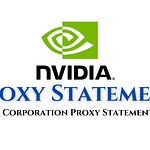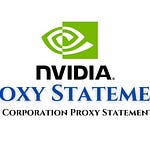NVIDIA 2024 Annual Report Briefing
Source: nVidia Proxy Statement for Stockholders Annual Report 2024
Executive Summary
NVIDIA has positioned itself at the forefront of a "new industrial revolution" driven by accelerated computing and generative AI. The company views 2024 as a "watershed moment" where its accelerated computing has reached a "tipping point." NVIDIA's strategy revolves around a full-stack computing infrastructure, encompassing hardware, systems, software, and services, creating a robust ecosystem. This comprehensive approach, combined with a strong focus on AI-driven markets like automotive, healthcare, and robotics, positions NVIDIA as a critical "AI foundry" for intelligence creation. The company is actively managing its supply chain to meet surging demand and is committed to corporate sustainability and responsible AI development.
Main Themes and Key Ideas/Facts
1. The Era of Accelerated Computing and Generative AI
Generative AI as a Critical Platform: Generative AI is identified as "the most critical computing platform of our generation" and is expected to "reshape the world’s largest industries and create an entirely new one."
NVIDIA as the Driving Force: NVIDIA, as "the pioneer of accelerated computing," is described as "the driving force of this new era."
Fundamental Reinvention of Computing: Accelerated computing has "fundamentally reinvented computing, and is the path forward for sustainable computing."
AI Factories: Generative AI is "starting a new industrial revolution where AI factories will manufacture intelligence." NVIDIA is positioned "at the center of the simultaneous computing and industrial revolution."
Exponential Growth: Generative AI models are increasing exponentially in scale, "doubling about every six months."
2. NVIDIA's Full-Stack Ecosystem and Market Dominance
Comprehensive Solution: NVIDIA offers a "comprehensive solution from the chip all the way to data centers." This "full-stack includes the foundational CUDA programming model that runs on all NVIDIA GPUs, as well as hundreds of domain-specific software libraries, software development kits, or SDKs, and Application Programming Interfaces, or APIs."
Incredible Ecosystem: "NVIDIA’s got great chips, and more importantly, they have an incredible ecosystem." This ecosystem includes "nearly 5 million developers and 40,000 companies," with "More than 1,600 generative AI companies… building on NVIDIA."
Reinventing Every Layer of Computing: NVIDIA has "Reinvent[ed] every layer of computing, from GPU architecture... to system interconnect... systems... software... to networking technologies... We reinvented computing from the ground up."
Data-Center-Scale Company: The company has transformed into a "data-center-scale company by combining with Mellanox, the world’s leading high-performance" networking solutions.
AI Foundry Model: NVIDIA operates as an "AI foundry like TSMC is a chip foundry. We manufacture custom NIMs like TSMC manufactures custom chips." This model emphasizes providing "technology, skills, scale, and business model to partner with any company," while clients retain "full ownership and control of their intellectual property."
Installed Base: There are "100’s of Millions of CUDA GPUs Installed Base."
3. Emerging Multi-Billion Dollar Markets
Automotive: "Automotive has joined gaming as a multi-billion-dollar run rate business." Key platforms include NVIDIA DRIVE Hyperion and DRIVE AGX Thor, with major automotive partners like BYD, Waabi, Nuro, Li Auto, XPENG, GAC, Volvo, Polestar, Lucid, Great Wall Motor, SAIC, ZEEKR, NIO, and Xiaomi utilizing NVIDIA's technology for AI-defined vehicles and autonomous solutions.
Healthcare and Robotics: "Healthcare and robotics are additional multi-billion-dollar opportunities." NVIDIA applies AI to these fields through platforms such as BioNeMo for digital biology and Clara for medical imaging.
Other Applications: NVIDIA's AI platforms extend to DLSS RTX neural graphics, Isaac robotics, ACE digital humans, NeMo LLMs, and various domain-specific languages (DSLs) for applications like genomics, drug discovery, weather simulation, 6G, quantum computing, and industrial digital twins.
4. Financial and Operational Highlights
Strong Demand in Fiscal Year 2024: "Demand for our data center systems and products surged in fiscal year 2024."
Supply Chain Management: NVIDIA is actively increasing "supply and capacity purchases with existing suppliers, added new vendors and entered into prepaid manufacturing and capacity agreements" to meet demand. Next-generation products are expected to be "supply-constrained based upon demand indications."
Significant Purchase Commitments: As of January 28, 2024, the company's consolidated outstanding inventory purchase and long-term supply and capacity obligations balance was "$16.1 billion."
Inventory and Liabilities: Consolidated inventories balance was "$5.3 billion" and total liabilities were "$22.75 billion" as of January 28, 2024.
Share Repurchase Program: In August 2023, the Board approved an additional "$25.0 billion" for the share repurchase program, without expiration. During fiscal year 2024, NVIDIA repurchased "21 million shares of our common stock for $9.7 billion."
Stock Performance: NVIDIA Corporation's stock has seen substantial growth, with a $100 investment on January 27, 2019, growing to $1,536.28 by January 28, 2024, significantly outperforming the S&P 500 and Nasdaq 100 indices over the same period.
Net Income: Net income for the fiscal year ended January 28, 2024, was "$29,760 million."
5. Corporate Governance and Sustainability
Board Diversity: The Board Diversity Matrix (as of May 14, 2024) indicates a commitment to diversity in gender identity and demographic background.
Risk Oversight: The Board of Directors oversees major risks including "Business Model, Strategic Execution, Product Quality and Safety, Operational, including Supply Chain and Sourcing, Regulatory, Public Policy, Legal, Intellectual Property, and Compliance, Financial and Macroeconomic, Information Security, including Cybersecurity, Brand and Reputation, Business Continuity, Corporate Development and Acquisitions, Management Development, and Enterprise Resource Planning."
Executive Compensation: Executive officers' compensation plans involve Performance Stock Units (PSUs) tied to company performance metrics like Non-GAAP Operating Income, Non-GAAP Gross Margin, and 3-Year Relative TSR compared to the S&P 500. There are stock ownership guidelines and a policy prohibiting hedging and pledging of NVIDIA stock by insiders.
Corporate Sustainability Principles: NVIDIA aims to "integrate sound CS principles and practices into every aspect of the Company," covering topics such as Climate and Efficiency, Human Capital Management, Product Value Chain, Human Rights, Trustworthy AI, and Public Policy Engagement and Accountability.
Trustworthy AI: The company acknowledges the importance of "inventing capabilities to align, guardrail, secure, and control models, sharing best practices, creating new policies, discovering new social norms, encouraging debate, and inspiring whole new areas of research in AI security and safety."
Auditor Selection: PricewaterhouseCoopers LLP (PwC) has been selected as the independent registered public accounting firm for Fiscal 2025, a selection subject to stockholder ratification.
6. Geopolitical and Regulatory Considerations
Export Controls: The U.S. government announced licensing requirements impacting exports of NVIDIA's A100 and H100 integrated circuits and systems to China (including Hong Kong and Macau) and Russia, and later for a subset of these products to certain customers and regions including parts of the Middle East.
Intellectual Property Protection: NVIDIA relies on "patents, trademarks, trade secrets, employee and third-party nondisclosure agreements, and licensing arrangements to protect our IP." The company acknowledges that IP protection may be weaker in some foreign countries, increasing "the possibility of piracy."
Legal Proceedings: The report mentions ongoing legal proceedings, including a putative derivative lawsuit related to channel inventory and cryptocurrency mining's impact on GPU demand, which was stayed pending resolution of an appeal.
Conclusion
NVIDIA's 2024 Annual Report paints a picture of a company deeply entrenched in and driving the current technological revolution. Its comprehensive ecosystem, strategic focus on AI across diverse industries, strong financial performance, and commitment to corporate responsibility underscore its significant influence and future aspirations in the global technology landscape. The company is actively addressing the challenges of rapid demand growth and evolving regulatory environments while continuing to innovate.













Share this post